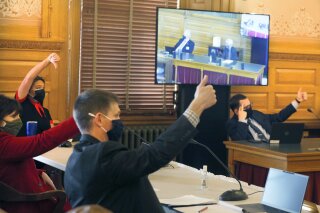Vote’s timing is key issue with Kansas anti-abortion measure

Members of the Kansas House Federal and State Affairs Committee signal whether they want to be recorded as voting yes or voting no on a proposed anti-abortion amendment to the state constitution, Thursday, Jan. 21, 2021, at the Statehouse in Topeka, Kan. The committee has approved the measure, which would overturn a 2019 Kansas Supreme Court decision declaring access to abortion a “fundamental” right. (AP Photo/John Hanna)
TOPEKA, Kan. (AP) — Republican lawmakers insisted Thursday that their proposed anti-abortion amendment to the Kansas Constitution be put to voters on the August 2022 primary ballot, leading to criticism that they fear it would fail if put to a broader swath of voters during that year’s general election.
The issue of when voters would decide the measure’s fate kept it from clearing the GOP-controlled Legislature last year with the necessary two-thirds majorities in both chambers. A few Republicans objected to anti-abortion groups’ plan to have a vote in the August 2020 primary, preferring it be decided instead by the broader group of voters who would vote in November’s general election.
A House committee approved the measure Thursday, and GOP leaders planned to have the full House debate it Friday. The Senate had planned to debate its own, identical version Thursday, but postponed action until next week because a member was absent.
Both would overturn a Kansas Supreme Court decision in 2019 declaring access to abortion a “fundamental” right under the state’s Bill of Rights. Abortion opponents worry that future court rulings could strike down many restrictions already in place in Kansas.
Abortion opponents believe the timing of the election on their measure is less of an obstacle to its passage this year after elections last year left the Legislature with more conservative Republican supermajorities. But lawmakers keep raising the issue, with some wondering why the vote wouldn’t be this November and more wondering why it wouldn’t take place the following one.
“It’s kind of the sweet spot, where we’ve got a good number of people turning out,” said Brittany Jones, advocacy director for the anti-abortion Family Policy Alliance of Kansas. “But it doesn’t get lost.”
The measure would declare that the Kansas Constitution doesn’t grant a right to abortion and that legislators can regulate it “to the extent permitted” by the U.S. Constitution. Approval by a simple majority of voters in a statewide election would change the state constitution.
Abortion opponents argue that without the changes, abortion providers will sue successfully to overturn a raft of abortion laws enacted with bipartisan support. They include a 24-hour waiting period, a law requiring most minors to inform their parents of planned abortions, and “right to know” rules that dictate the information providers must give patients.
Abortion rights supporters see the proposed amendment as a big step toward a statewide abortion ban, because one would be possible if the U.S. Supreme Court overturned its 1973 Roe v. Wade decision protecting abortion rights nationwide. They also contend that even without a ban, further restrictions would harm women’s health.
Even some Republicans who argue for putting the proposal to voters see anti-abortion groups picking August 2022 for a vote as a purely political calculation.
“They think they have to pick and choose an election cycle that favors them the most,” said former state Rep. Don Hineman, a moderate Dighton Republican who retired after voting against the measure last year because of the statewide vote’s timing.
Turnout in statewide primary elections has averaged 25.6% since 2010, and the figure for general elections is 60.3%. Since 2010, an average of 3.5 times as many Republicans have cast ballots in primaries as Democrats; unaffiliated voters must choose a party at the polls to participate.
University of Kansas political scientist Patrick Miller said primary elections attract more partisan voters and typically, “the middle of the electorate tends to fade away.”
Julie Burkhart, founder of the abortion rights group Trust Women, added: “And there’s the potential for marginalizing our unaffiliated voters.”
When the House Federal and State Affairs Committee considered the measure Thursday, anti-abortion lawmakers rejected an attempt by Rep. Brandon Woodard, a Lenexa Democrat and abortion rights supporter, to switch the statewide vote to November 2022.
Woodard said later, “They think it would pass in August and not in November.”
Kansas holds municipal and local school board elections this year, and it’s possible to put the proposed amendment to a vote in November. Conservative Republican Sen. Dennis Pyle, of Hiawatha, floated the idea this week, arguing for amending the constitution as quickly as possible.
But other abortion opponents said turnout in municipal elections is too low — less than 19% statewide last year — and Pyle’s idea got no traction.
But if low turnout in an election this year is a concern, Jones also argued that the amendment might not get enough attention on a November 2022 ballot, when voters will decide races for the U.S. Senate and governor.
In August 2022, unaffiliated voters still could get a short ballot with only the abortion question. Jeanne Gawdun, a lobbyist for Kansans for Life, the state’s most influential anti-abortion group, predicted turnout would be far higher than for a normal primary.
“This is an opportunity to increase primary turnout, and that should make everybody happy,” Gawdun said.
But Miller said the “simplest explanation” is than insisting on an August 2022 vote is a “smart, strategic choice.”
“Essentially, you’re choosing your voters,” he said. “Turnout is going to be skewed even more in your favor than it already is.”
___
Follow John Hanna on Twitter: https://twitter.com/apjdhanna
